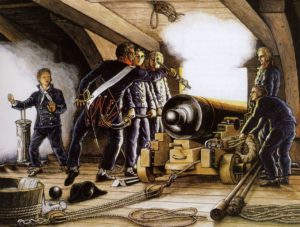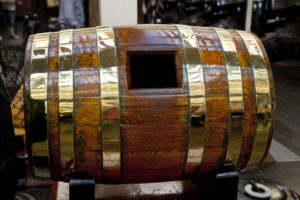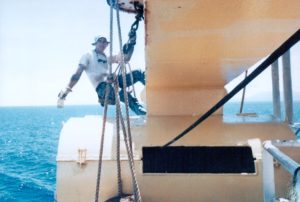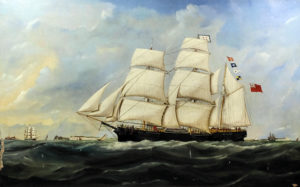Every day we had an “at sea” day (not in a port), the Captain of the Eurodam gave a “Captain’s Minute.” Captain John Scott would tell us about the weather and the seas (calm seas with sunshine or squalls with moderate swells). Then he would talk about the ship’s position, describing what city we were parallel to and how far away from it we were. Finally, he would talk about the “Nautical Term for the Day.”
Captain Scott has a wonderful sense of humor. He is from New Zealand and is probably close to 60 with over 40 years experience at sea. He gave an “Ask the Captain” session that was funny and really interesting. After hearing about his long career at sea we felt very confident he knew what to do in any situation.
Captain Scott’s “Nautical Term for the Day” was a favorite part of our cruise. Every day he would introduce a term that we commonly use and tell us its origin. Here are my favorites that he taught us.

Nautical Term #1: “Son of a Gun”
Captain Scott explained that many of the sailors on ships in the 17th and 18th centuries were conscripted – not on board of their own free will. Consequently, when the ship would dock, the sailors were not allowed off the ship because they might run away. Instead, prostitutes would come aboard the ship to keep the sailors from being “lonely.” The sailors were not particular about the prostitutes and sometimes a woman would come on board who was pregnant and give birth while on board. Because the father of the child was not known, the ship’s log would record the child as a “son of a gun.”
Unfortunately, Snopes says this is an unlikely origin for the term, suggesting instead that the phrase came about because of the position “gunner” on a ship. When a gunner would have a child, the child would be called a “son of a gun.”

Nautical Term #2: “Scuttlebutt”
Captain Scott told us that this is a combination of two naval terms. The first, scuttle, means to cut a hole in the ship that makes it sink. The second, butt, was the water cask where sailors could get a drink of fresh water. While they stood around the cask, they would tell stories or share rumors. Thus the term “scuttlebutt” became a word for rumors.
Nautical Term #3: “Between the Devil and the Deep Blue Sea”

Although I have often used this phrase to describe having to choose between two bad options, I didn’t know the origin of the term. Captain Scott first defined “the devil” as the last piece of wood on the deck of the ship. This is the piece that curves the most and has to be very watertight, so it was very difficult to put in place. Instead of a straight plank, it had to be curved by hand so the fit was secure. Sometimes a sailor would be suspended over the side of the ship to effect some repair or caulk a seam. When he was so suspended, he was “between the devil and the deep blue sea.”
The first citation of the phrase is in a book by Robert Monro published in 1637. It was commonly in use by the mid 1800’s. The phrase became really popular, however, when used in a Cab Calloway song in 1931.
 Nautical Term #4: “Three Sheets to the Wind”
Nautical Term #4: “Three Sheets to the Wind”
The phrase “three sheets to the wind” is commonly used to describe someone who is drunk. Captain Scott described a sheet as the main line that controlled the trim of a sail – how taut it is. Sailing ships back in the day often had three masts with three sheets to control the trim on all the sails of each mast. If one sheet was loose, the ship would lose speed and steering would be difficult. If all three sheets were loose, the ship was uncontrollable. A sailor who was drunk was uncontrollable, thus “three sheets to the wind.”
Nautical terms 2, 3, and 4 are supported by many different sources, including Wikipedia, Wiktionary, and the Nautical Terms Dictionary. So Captain Scott may have been a little off with the first term, but he was spot on with all the others.
Our cruise to Hawaii was wonderful and Tom and I had a great time. We loved being at sea for so long and learning about the Hawaiian culture. Captain Scott was one of the people we really enjoyed learning from. And with this post, alas, it is time to say “aloha” to Hawaii and our cruise.

Loved every story of your adventures in Hawaii…and learned a lot – thank you!!
Thanks for sharing!
The nautical terms were very interesting. We were glad to have a captain who communicated so well with the passengers. Learning and growing help keep the adventure going!